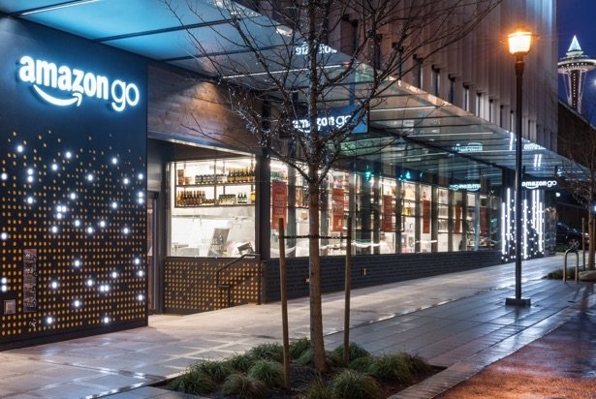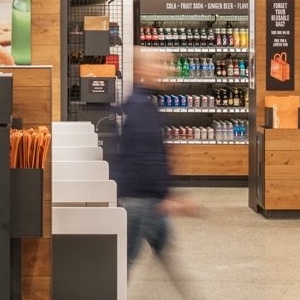Some food sector writers seem to think so. And they’re basing their predictions on the skyrocketing popularity of delivery services like Amazon, and meal-in-a-box vendors which seem to be sprouting up like mushrooms after the rain. But I see this scenario as dangerous and, potentially downright unhealthy…
 AmazonGO: ‘Just walk out’. Everything’s handled by Amazon and your smart phone.
AmazonGO: ‘Just walk out’. Everything’s handled by Amazon and your smart phone.
The next, intermediary step toward total-online grocery shopping?
One blogger whose lengthy tract on this subject I’ve just read says it’s likely that supermarkets – as we know them – will be extinct in 20 years. Imagine… All your food coming by delivery from sources like Amazon/Whole Foods or those new meal-in-a-box outfits that have recently started popping up on the internet and in intensive TV ad campaigns.
Online grocery sales grossed over (US)$20 billion in the U.S. last year alone, and that figure is forecast to reach (US)$100 billion by 2025. That forecast from the folks who have the most to gain by such expansion, and it also assumes no hitches come up along the way.
The blog post I read implied – but did not come right out and say – that some of us who want to cook will still be able to get what they need to do so. But the supermarket as we know it is doomed.
I can see, in one possible gloomy scenario, that supermarkets will continue their trend toward selling prepared meals, Sandwiches, Salads, Rotisserie Chickens and ‘pre-butchered’ Veggies for Vegans and Salad Fans in general. They’ll devolve into large-scale versions of street carts or take-out joints. I’ll concede that speed and convenience will never go out of style. But with commercial preparation comes ingredients you might not want your family to consume and preservatives. And your choice will be severely constrained.
And therein lies the rub…
There’s the spectre of the health of the population falling into question as people veer more and more to processed, prepared, pre-packaged and standardized food products. Doctors, dieticians and other health professionals are already warning that western society’s love of convenience foods is driving the obesity, diabetes and heart disease epidemics. Those afflictions, together, are generating tens of billions of dollars a year in health care expenses that we could avoid paying simply by encouraging people to eat more fresh foods they they prepare themselves!
Okay… Assuming we do go ‘delivery’ for our food supplies and don’t – through some miracle – turn into a culture of glassy-eyed couch slugs… What else is dangerous about the no-supermarkets scenario?
First, a few gigantic organizations will take control of the food supply and set prices. It’s already bad enough that corporations like WalMart and Weston/Loblaw’s are dominating the supermarket landscape. We all lose when these giants restrict selection because it’s convenient for them to administer a few items rather than many.
Second, how can we be sure that food shipped from who-knows-where, by Purolator or FedEx or Parcel Post will arrive at our door unspoiled and wholesome? That’s a real concern. I guess the manufacturers/packagers just pile on more preservatives and cross their fingers. Yuk.
Third, what about payment, or transaction ‘reconciliations’. Seems simple enough to set it up the way Amazon has for its AmazonGO stores, through an app that charges your purchases up to your Amazon account. But how do you complain about, or obtain redress for products shipped to you in error, missing items in a shipment, or items that have spoiled or been damaged in transit? I can’t think of any mechanism to address ‘issues’ which wouldn’t spawn nightmares.
Fourth, do the inevitable delivery fees offset the savings in gas and time that food shopping online entail? And are you willing to wait a day or two for your food to arrive?
Supermarkets will stay with us – in some form…
No, I don’t think supermarkets will become extinct. But their role may change dramatically in the next 10 to 20 years. I guess we’ll just have to wait and see…
~ Maggie J.

